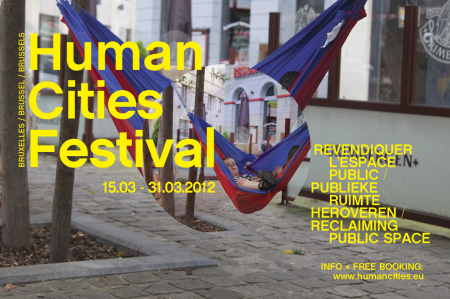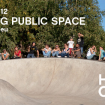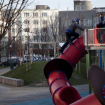
Civil Society reclaims public space. Cross perspectives based on research
Day 1 : 15 March 2012
Morning session : Analytic Highlight (lectures)
This line will focus on the content and the results of research projects using civil society initiatives as case studies. More particularly, this line will explore the following questions:
- From the material standpoint, what incidence can this type of initiative have on the production of public space? What are the varieties of forms adopted? To what extent can they contribute to aesthetic, semantic, functional, ecological innovation in the way cities develop?
- As concerns living together, in what ways do these initiatives integrate or reshape concepts such as mixed neighbourhoods, hospitality or conviviality? How can they create new means of appropriation, new networks? Do they redefine relations between public and private ownership of the space?
- For common discussions and actions, what is the capacity of these initiatives to formulate new types of participation? What is their incidence on the exercise of citizenship? What type of commitment do they entail from those involved? To what extent can they enable so-called “weak” actors to have an influence on and visibility in public space? In a world governed by uncertainty, what are their ideological backdrops, what is their critical potential, what forms of common good do they defend?
Afternoon session : Methodological Highlight (lectures)
This line will focus on methods as well as theoretical frameworks mobilized by researchers to observe, describe, understand, assess, theorize and/or spread civil society initiatives.
This line will consequently explore the following:
- As concerns the methods, how do researchers create or adapt their tools? What place is left for empirical studies and work in situ? How do they analyze and make models of the data collected? In the case of “action” research or “by design” research, how do researchers carry out a reflexive process, how do they analyze the transformations enacted by the experiments they carry out?
- With regard to the theoretical level, what position do researchers take? How do they integrate the various dimensions of these civil society initiatives in terms at spatial, social and political levels? Are they backed up by theoretical reflection on which urban activism has long been based or do they use new intellectual configurations?
Day 2 : 16 March 2012
Morning session : Operational Highlight (lectures)
This line will focus on “action” research or “by design” research that are inspired by civil society initiatives. This type of research often proposes prospective scenarios, design processes or toolboxes to improve or inspire the production of public space within contemporary cities.
This line will explore the following issues:
- Is it pertinent to propose the transfer of initiatives created in a particular context elsewhere? If so, what are the criteria, the forms and the extent of their adaptability? To whom is this type of tools made available? What responsibility do researchers have in these processes?
- What happens when this type of initiative is transposed outside the context in which it emerged? What are the results, spatially, socially and politically? Does trying to generalize “good practices” contribute to a certain standardization of public space? Does this type of scheme contribute to institutionalization or recovery of citizen movements, or, on the contrary, does it empower them and increase their numbers and visibility?
Afternoon: Workshops in public spaces
Workshops will be organized in several public spaces in the city in collaboration with international and Brussels partners. This will give participants an opportunity to question and explore practices on the issues considered during the presentations.
Address:
Royal Library of Belgium (Lippens auditorium)
Boulevard de l’Empereur 2
1000 Brussels
Attendance:
Free of charge – Registration mandatory (limited capacity)
Further Information:
www.humancities.eu, humancities@promateria.be
The full programme of the lectures and the workshops will be available soon.
Registration on-line as from 16 February 2012.
Öne çıkanlar
 updates
updates
Festival Human Cities: Online video!
Festivaller
15 – 31 Mart 2012
Human Cities Festival 2012: Reclaiming Public Space
29 Eylül – 03 Ekim 2010
Brussels Istanbul: Kamusal Alan Tasarlamak
06 – 16 Mayıs 2010



